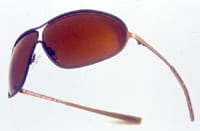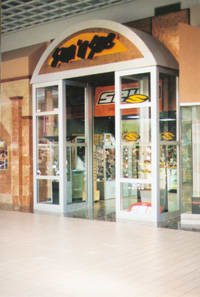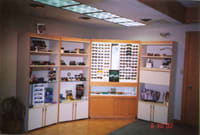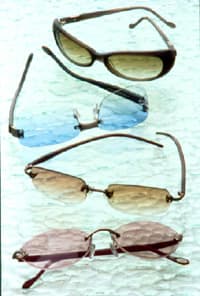Competitive
Training
Selling sunwear can be an exciting,
profitable business, if you train your staff on products and sales techniques. This primer will help you get started on the path to a more knowledgeable staff
By Erinn Morgan

"We have a lot more competition now," says Noall Knighton, president and CEO, Knighton Optical, which has 23 stores in Utah. "I also think sunglasses are a big Internet product."
Some eyecare professionals have decided that the way to stake their claim in the sunwear business is to have a well-trained, knowledgeable sales staff. This strategy has led, in many cases, to increased business. "It's all about training and product knowledge. That's why people come to an in-store retailer, to get knowledge. If they don't need to get information or to speak with someone, they can probably get it cheaper on the Web," he says.
Tactics vary on this front, but it often comes down to having one person on your staff who is responsible for employee training.
There are many resources for optical retailers who wish to implement a staff training program for selling sunwear. The first step is to view your business as a retail operation and take cues from outside the industry. The next step is to train your employees.
|
|
|
|
Romeo Gigli style RG 509S from Allison |
|
NEW EMPLOYEES
Who trains the staff to sell sunwear? Depending on the make-up of your shop, it could be the owner, the doctor, the dispensary manager, or the head optician. "I trained the original staff that has been here long-term and they now train the new employees coming in," says Jon Gruen, owner of Gruen Optika, a high-end chain with six locations in Manhattan, and one each in Greenwich, Conn., Huntington, N.Y., and East Hampton, N.Y.
Ultimately, the best person to train others will be the one who knows the most about sunwear. At Knighton Optical's Sun 'n See, a sunglass retail division with two store locations and two mall kiosks in the Salt Lake City area, district manager Jamaica Hendrickson trains Sun 'n See employees as well as some of the Knighton Optical staff.
|
|
Business Barometer |
|
How is sunglass business? Some optical retailers report profits, others say specific areas are on the rise, and a few say sales are flat. Here, some comments from the front lines of sunwear business: * "We are doing more in sunwear sales--and carrying quite a bit more product than we have in the past few years. Everybody's looking for sunglasses today, especially designer eyewear--about 75 percent of our assortment. Rx sunwear is also very strong for us. We are not a street-front operation, so impulse-buy product like plano sunwear is not as feasible. About 80 percent of our sunwear is prescription." --Ken Eissner, president, Albright Opticians with locations in Lititz and Lancaster, Pa. * "Plano sunwear started this season with a bang and is growing quite well. For the first time we are carrying a bit less expensive product in the plano area because I felt we were missing a niche area. We always had product priced from $150 to $250 and up. We added sunwear in the $125 to $150 range and it has been very successful. Rx has always been good for us--partly because we fill the needs of protective eyewear for our area." --Jon Gruen, owner of Gruen Optika with six locations in Manhattan, and one each in Greenwich, Conn., and Huntington and East Hampton, N.Y. * "The Rx business has been an increasing market for us. We have been flat or down, however, in the sunglass business due to increased competition--Oakley bought Iacon which has a Sporting Eyes store in Salt Lake City near us. Sunwear sales on the Web have also been a strong competitor--we are launching our own site, www.knightonoptical.com, which will sell sunglasses, reading glasses, and contact lenses." --Noall
Knighton, president and CEO of Knighton Optical chain, which has |
Training new hires in selling sunwear is an important process, but it does not necessarily have to be a long one. "I do two eight-hour shifts with new people--16 hours of training is plenty," says Hendrickson. This training time consists of her and the new employee spending time together on the sales floor during store hours to go over the sunglass lines' features and lens technology. "I think that product knowledge is the most important part of selling sunglasses," she says.
While many shops will train employees on the computer first to enable them to ring up sales, Hendrickson says that she believes in training on product first because this will help them make the sale. "People are not going to pay $300 for a pair of sunglasses if they don't know what the seven layers are in that layered lens. For their money, customers want to understand the different features of the frames."
Dispensers may find that training works because they have additional incentives to make the sale. For example, at Sun 'n See the employees are paid on a flat hourly rate and given a commission for sunwear sales.
Another point Hendrickson makes is that in-store training is optimal. "If you can point to the products in the displays in the store, they are more likely to be better able to remember the features when they are asked about this frame again by a customer."
After the initial training has been completed, Hendrickson makes herself available at all times for questions. She also spends one day per week in each store talking with employees and teaching them about new products.
Other training-savvy dispensers say new employees should be taught the importance of presenting sunwear to every customer. Reinforcing the idea of sunwear to customers will certainly increase the incidence of sunwear sales. It is a simple principle that could lead to a stronger bottom line. "We always recommend sunwear and tell them to try to steer people toward polarized, and this works. We find that those who get polarized never go without it in the future," says Ken Eissner, president of Albright Opticians, which has locations in Lititz and Lancaster, Pa.
The same philosophy works at Gruen Optika in New York City, where the staff is trained to recommend sunwear when they are about to complete a transaction. "They ask patients if they ski, go boating, or go to the beach on vacation. They also always recommend plano sunwear for contact lens patients."
Another key point: Read a person's body language. "People's styles are all different," says Hendrickson. "What you like and what they like are going to be two different things."
CONTINUING THE PROGRAM
No matter how well your employees are trained in the art of selling sunwear, there is always more to learn down the road. "I try to give them the base knowledge and then keep them updated," says Hendrickson.
She also leaves printed updates about products, new lines, and technology in each store after her weekly visit--then employees have to sign off that they've read and understood the material.
|
|
|
|
Sun 'n See is a sunglass retail division of Knighton Optica |
|
In addition, training is provided for veteran employees from January through May, when new products come out. "I also always leave memos for employees about new procedures in-store as well as the ways to keep the store and merchandise clean," Hendrickson adds.
One of the best tools to help you continue training your veteran staff is information from journals and magazines. Everything from new product and technical information in trade magazines to fashion and business information in consumer magazines can give your employees an edge on the selling floor.
"We read all the journals and magazines that come out. There are about eight of us on staff, not one with less than 10 years of experience. We have been in business long enough to know what needs to be done to sell sunwear, but we do keep our staff up to date with what's out there, the new products, new displays, and new technology," says Eissner.
VENDOR VALUES
Another way to train employees--as well as yourself--is by taking advantage of in-store informational seminars given by product vendors. Many companies will provide sales training and information about their products in the form of a clinic given when a new line is brought in or once a year for existing clients.
|
|
|
|
Top: Albright Opticians has locations in Lititz and Lancaster, Pa. Above: Celine Dion Eyes Sunwear by Kenmark, styles (top to bottom) 5017S, 4013S, 4012S, 4015S. |
For example, when Albright Opticians brought in the Chanel line, a representative came in to offer an informational clinic about the brand and its eyewear products. "The rep spent about an hour going over the line, showing us the features, the history of the brand, and how to present it," says Eissner.
"It's great to have that education to impart to the customer. We are an office filled with men, so we only know the brand from seeing a Chanel handbag for $2,000 at the department store. We needed this knowledge to sell the line."
Sun 'n See also utilizes vendor seminars to train its sales staff. "The new vendors that we get in all want to do training and clinics for our employees. Many of the existing vendors also do yearly clinics," Hendrickson says.
Most of these events are held in-store with the occasional off-site seminar. Most last only one to two hours, but a few can range up to a half or full day.
Does all the training and education pay off in the long-run? No doubt, say many optical retailers. " When I came in, our chain of stores was only at 50 percent of last year's totals. Within two weeks we were back at 100 percent. It was because nobody knew what they were talking about. They didn't have the knowledge and nobody cared. We changed that pretty quickly and saw it immediately in our sales," says Hendrickson.
New or veteran, all employees can benefit from training. A smart plan can be implemented in the simplest of ways, just by taking advantage of seminars, journal articles, and product knowledge imparted by others. An all-around positive thing, training can enhance your sunwear sales, your employees' knowledge, customer satisfaction, and your profits.
|
Words of Wisdom |
The top ten training mantras. 1. Ask all customers if they want sunwear. 2. Know the features and benefits of every product you carry. 3. Be able to explain the features and benefits of every product you carry. 4. Learn about products in-store so it is easier to remember. 5. Understand new frame and lens technology. 6. Understand the current sunwear fashion trends. 7. Watch body language--help customers feel comfortable. 8. Read, read, read--keep up-to-date with trade and consumer magazines. 9. Ask questions: If you don't understand something, ask your manager. 10. Attend vendor seminars and read product literature. |







